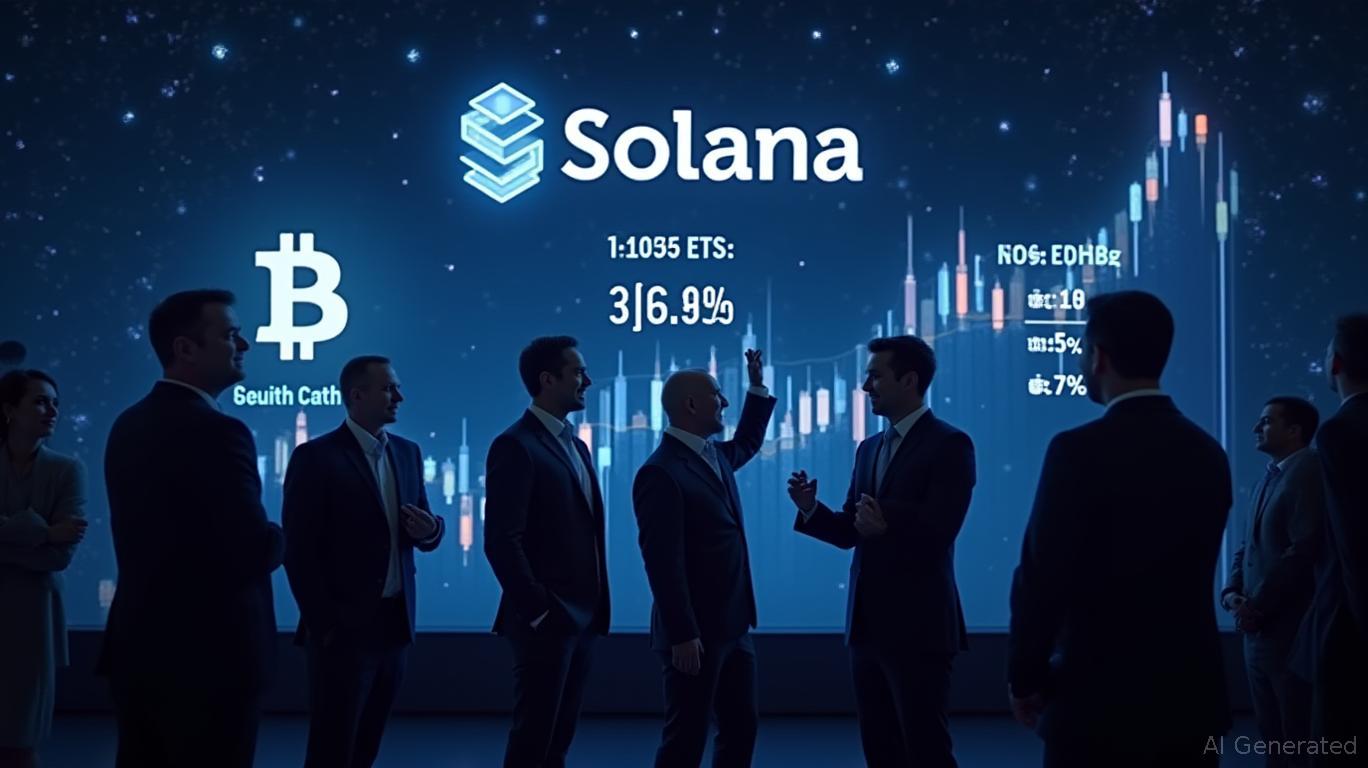Crypto Crime Battle Faces Hurdles from Varied Analytics While EU Advocates for Worldwide Standards
- Europol's EFECC unit prioritizes global crypto crime combat through enhanced cross-border cooperation and standardized blockchain analytics tools. - 2024 saw $40.9B in illicit crypto flows, with advanced laundering techniques like privacy coins and layering evading detection in major EU takedowns. - Public-private partnerships like T3 FCU froze $300M+ in criminal assets globally, while inconsistent analytics protocols hinder investigation collaboration. - Experts demand universal crypto crime definitions
The European Cybercrime Centre, operating within Europol's European Financial and Economic Crime Centre (EFECC), has committed to strengthening international partnerships and increasing resources to tackle the rising challenge of cryptocurrency-related offenses. As criminal exploitation of blockchain technology becomes more advanced, law enforcement agencies across the EU are focusing on collaborative investigations that cross national borders and on developing unified tools to monitor illegal crypto transactions. Burkhard Mühl, who leads EFECC, pointed out that these offenses now require substantial resources due to their international nature, and he called for ongoing investment to overcome issues such as inconsistent blockchain analysis and a shortage of expertise in open-source investigative tools, as detailed in a
The magnitude of the issue is significant: Chainalysis projects that in 2024, $40.9 billion in illegal crypto funds will be received, not counting conventional crimes where crypto is used for payments. Criminals are adopting complex layering strategies and privacy-oriented cryptocurrencies to avoid law enforcement, as recent crackdowns have shown. Europol has led operations that dismantled a Latvian cybercrime group laundering over $330,000 in crypto, a hawala system moving $23 million, and a fraud operation that stole nearly $540 million from 5,000 victims, according to the Europol report. These cases demonstrate the EU’s active enforcement efforts but also reveal the difficulties of investigating crimes that span multiple countries.

A major obstacle is the absence of consistent standards in blockchain analysis. Diana Pătruț from the Blockchain Intelligence Professionals Association (BIPA) explained that different analytics companies often reach different conclusions when tracking transactions, and inconsistent methods for identifying wallet owners make teamwork difficult, as noted in the Europol report. She advocated for collaborative efforts between the public and private sectors to create universal standards, emphasizing that insufficient training in open-source tools makes investigations even harder.
Collaboration between public and private sectors is becoming increasingly important. The T3 Financial Crime Unit (T3 FCU), a joint effort by
International collaboration is gaining momentum. The 9th Global Conference on Criminal Finances and Crypto Assets, jointly organized by Europol, the UN Office on Drugs and Crime, and the Basel Institute on Governance, stressed the importance of unified strategies, according to the Europol report. Mühl cautioned that without continued funding, the pressure on EU law enforcement could increase, potentially undermining confidence in digital assets. At the same time, T3 FCU and its expanded T3+ initiative, now including Binance, are promoting stronger ties between regulators and private companies.
Yet, new threats are constantly emerging. Reports on T3 FCU’s activities indicate that hackers linked to North Korea are testing ways to insert harmful code directly into blockchain networks, bypassing standard security measures. Meanwhile, physical attacks on crypto owners to steal their private keys—known as wrench attacks—have risen in France, with 16 cases reported in 2024, as highlighted by the Europol report. These methods take advantage of the pseudonymous nature of blockchain, requiring flexible and evolving countermeasures.
Specialists recommend treating crypto crime as part of the broader landscape of financial crime. Pătruț argued that without clear, universally recognized definitions for crypto-related offenses, it’s difficult to determine if they are more prevalent than traditional financial crimes. She instead called for a comprehensive approach as cryptocurrencies become more integrated into mainstream finance, with tokenized assets and stablecoins introducing new vulnerabilities, as the Europol report advises.
Europol’s SIENA platform for intelligence sharing and its use of AI-powered analytics are key to its approach, aiming to forecast illegal activity and improve real-time cooperation, the Europol report concluded. As blockchain technology continues to develop, so must the strategies to prevent its abuse. The EU’s focus on standardization, public-private collaboration, and international partnerships will be crucial to staying ahead of criminal tactics.
Disclaimer: The content of this article solely reflects the author's opinion and does not represent the platform in any capacity. This article is not intended to serve as a reference for making investment decisions.
You may also like
Bitcoin News Update: Analyst Highlights How MSTR's Convertible Bonds Prevent Forced Bitcoin Sales
- MSTR's convertible debt structure allows debt repayment via cash, stock, or both, avoiding Bitcoin sales during market downturns. - The company raised €350M through a 10% dividend-bearing euro-denominated preferred stock offering to fund Bitcoin purchases. - Q3 results showed $3.9B operating income from Bitcoin gains, driving a 7.6% stock surge to $273.68 post-earnings. - Risks persist if Bitcoin fails to rally in 2028, potentially forcing partial liquidation amid $1.01B 2027 debt obligations. - MSTR hol

Solana News Today: Solana ETFs Surpass Bitcoin as Staking Returns Attract Institutional Investments
- U.S. spot Solana ETFs (BSOL/GSOL) attracted $199M in 4 days, outperforming Bitcoin/Ethereum ETF outflows. - 7% staking yields drive institutional inflows as investors rotate capital from major crypto assets. - Despite ETF success, SOL price fell below key support levels, raising concerns about $120 price floor. - Strategic staking and treasury purchases boosted Solana's institutional appeal, with $397M in staked assets. - Market remains cautious as ETF competition intensifies, with Bitwise's BSOL outpaci

Bitcoin News Today: Bitcoin’s Fourth Quarter Surge: Impact of Trade Disputes, Stronger Dollar, and Evolving Global Economic Strategies
- Bitcoin fell nearly 15% in October 2024, its worst quarterly start since 2022, driven by U.S.-China trade tensions, dollar strength, and macroeconomic caution. - A 100% U.S. tariff on Chinese imports and Fed rate-cut delays exacerbated selloffs, triggering $1.3B in liquidations during a flash crash below $103,000. - Key support levels at $107,000 and $101,150 face retests as traders warn of further declines, with market cap dropping below $3.6T amid fragile liquidity. - Wintermute denied Binance lawsuit

BNB News Today: AI and Blockchain Unite to Transform the Industry Through Decentralized Innovations
- ChainOpera, an AI-powered blockchain project, raised $40M+ in funding to expand decentralized infrastructure, highlighting growing investor confidence in AI-blockchain convergence. - FedEx partners with ServiceNow to implement AI-driven supply chain analytics, aiming to boost operational efficiency through real-time disruption prediction and automation. - BNB Chain emerges as an AI innovation hub with Avalon Labs' AI-MaaS marketplace and AEON's autonomous payment SDK, enabling decentralized AI model depl
